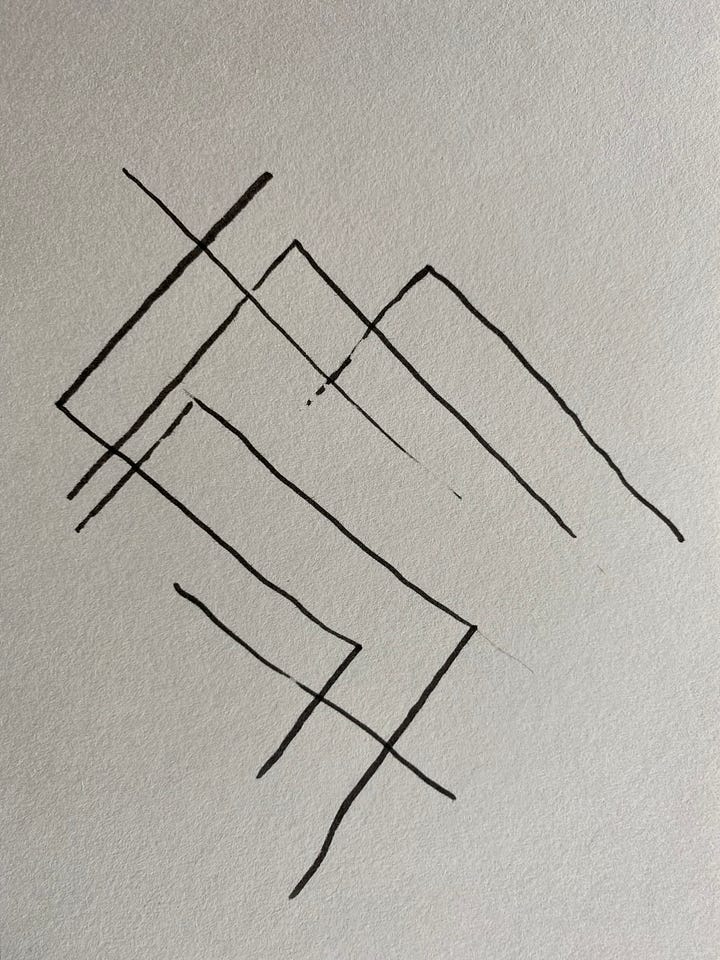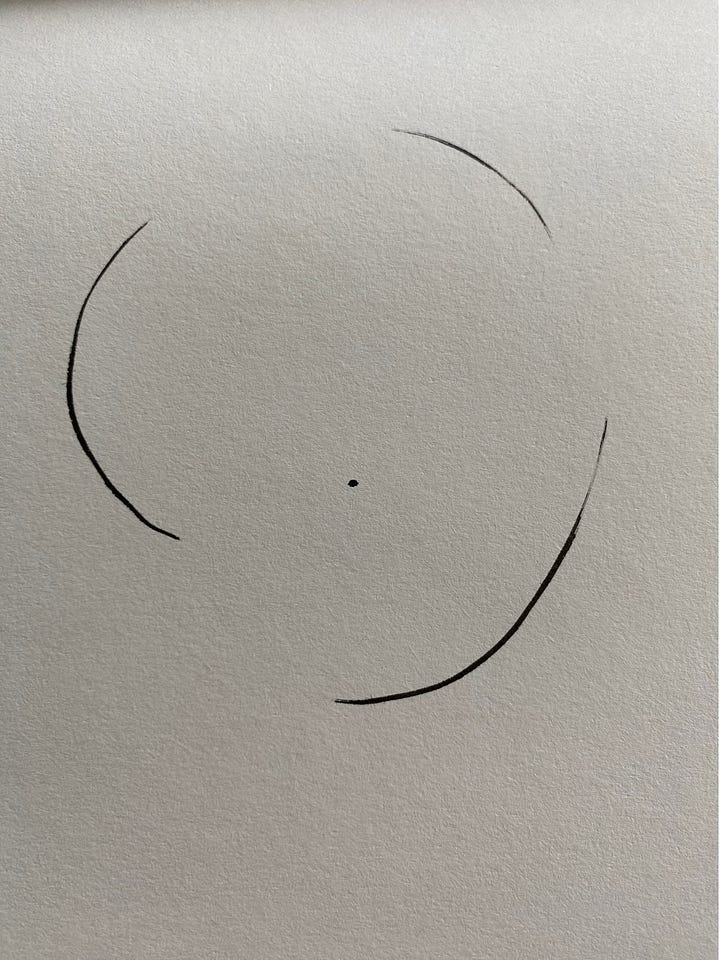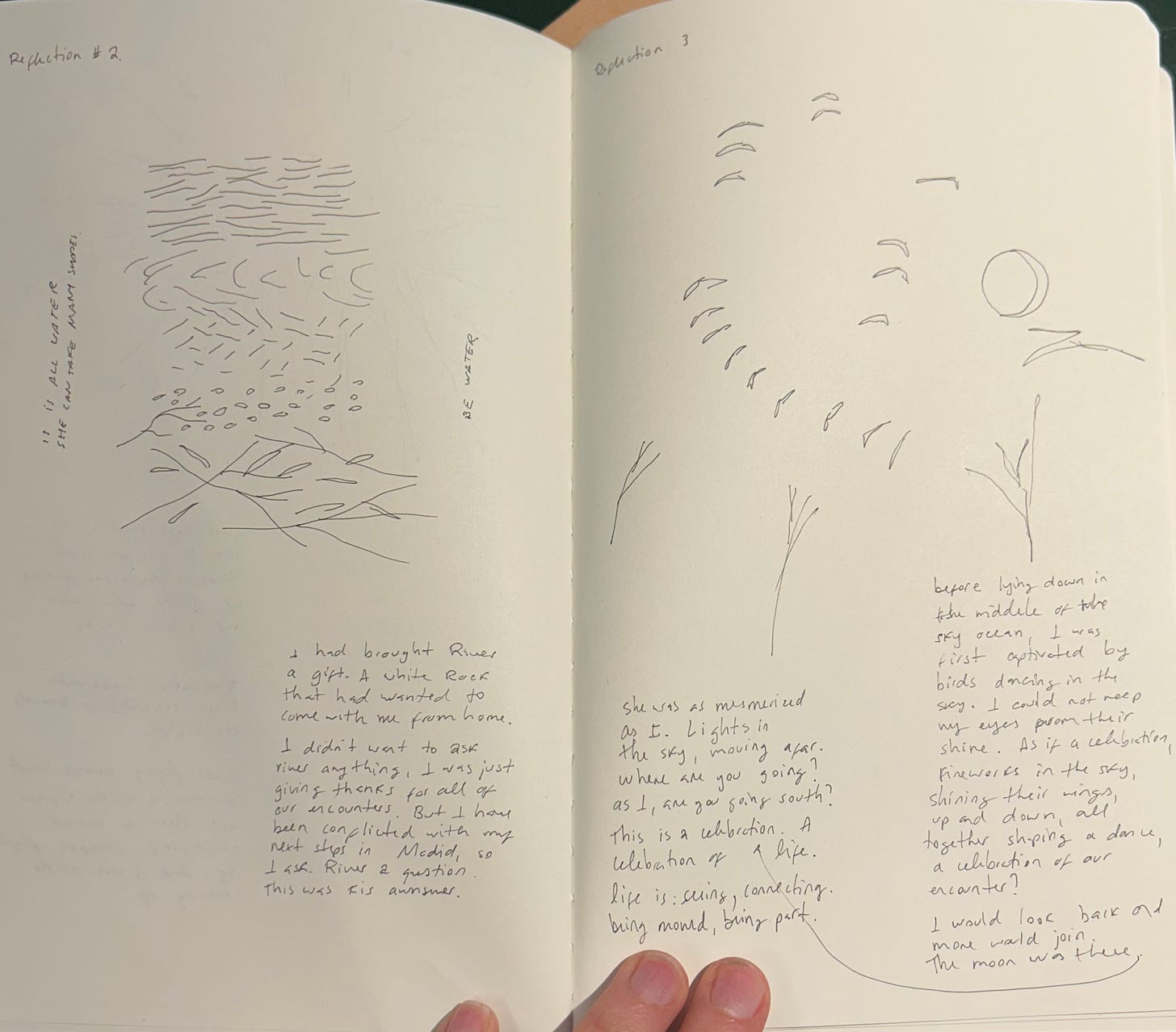A Cycle of Inquiry 2
Languages of connection
This is the second post reflecting on the Sentient River cycle of inquiry in the early winter of 2023. We were quite clear that our human language, especially English, was a language of separation. It creates categories of perception, structures in our psyche, that define experience and distinguish between what is ‘real’ as opposed to ‘illusory’. We agreed it was important to blur these categories, to find ways to loosen the hold of the way language defines experience, and through this find more direct, unmediated contact with River.
One clear example of this can be seen in what we take as ‘River’. Conventionally, River is the flow of water between banks; but in many ways these ‘banks’ are formed of human expectations, and often of human action. Once we loosened and expanded our definition of ‘River’ we could see that ‘River is everywhere’, as Luisa summarized:
I wonder, what is it about rivers… as connectors of that territory at large. I feel this… horizontal line is evidently a gateway, an immediate reflection that connects the heavens and the deep unknown. And at the same time, it's this fluid, interconnected rhizome that spreads across under and over the land, reaching mountains and oceans and connecting the territory at large. What is it about water that's holding life and being life itself?
And Ezekiel walked out of a frosty day:
wondering at the frost and the way it's like this thin film of river that gets painted on top of the land… seeing it blurring my notion of river or frost as… bounded categories and feeling the connectedness of them…
This led us to reflect on different languages and what we could learn from them.
Voice of River and Landscape
Dave, doing his morning sit in his hut looking over the Fowey estuary, half in meditation, half witnessing the sounds and sunlight:
It really sharpened my listening… to the curlews and gulls and then suddenly to the crows fighting an aerial battle. I was intensely aware of the sounds of the river, of the river’s voice. This is the voice of the river, the voice of the landscape, the water the animals and everything. The wind in the trees is always a unique voice of this landscape being. And it was very clear today how much a part of it are the birds, getting on with their bird world and beyond anything we pay any attention to. Until you listen. So that was that was my morning. I'm grateful for being led by the hand to pay to pay attention.
On the same night, Ezekiel is also identifies the unique sound of place:
I listen deeply, gazing skyward. Then something in my perceptual field shifts, and I am ushered across another threshold… I realize that this sound is this place; this sound is the voice of this place. I’m not hearing an abstract collection of notes that could be replicated by another band of trees elsewhere. This sound is utterly, unmistakably, radiantly unique. This sound is this land speaking – singing! – in its own voice.
As Luisa responded
I wasn't actually thinking about the land speaking to me… But now hearing about listening and understanding sound as voice of river, I think it adds another layer to what I was encountering that I perhaps wasn't truly listening, and I love it that there was something by beyond.
Artful languages
As part of our inquiry practice, we each visited River weekly and posted an account of our visit in our shared Google folder, usually in prose with some pictures or video. The written account initially took the form of a narrative of experience, but over time different members experimented with different forms.
Drawing
Luisa, an artist and designer, and speaking English as a second language, was possibly the most experimental of us all in using imagery as the basis of her accounts. She posted photos of her sketchbooks:
and more carefully constructed piece with images and words side by side:
How does one draw sound?
Is it through circles?
I had drawn sound once, or twice.
I like the idea of drawing a language
I can't seem to locate the shape, nor understand.
Luisa’s visual language (see also here) was appreciated and opened new perceptions for others. Kathleen:
I love the way, Luisa, you captured the presentational aspects of your engagements too with just those simple lines on the page, they convey so much feeling about the different textures of river and water that maybe you can't or nobody could put into words precisely.
Ezekiel:
I feel like there's a something about maybe your training as an artist and architect, and the familiarity that you have with shapes, and the language of shapes… I feel in experiencing your encounters and the way you represent them that I'm almost picking up this other language… it's like a foreign language and I can recognise that word, but I feel like you have this fluency with this different way of perceiving and also speaking, listening and speaking, being in the conversation which is really, really lovely.
Dave:
There's simply something that I can't quite grasp in Luisa's awareness because I don't have that kind of mind, those senses…
But Luisa was not alone in exploring visual images. David on several occasions made pictures or diagrams. He told the group, ‘I was very taken with Luisa's drawings of sound and things last time’ and also influenced by a quote from the American artist Barnett Newman: ‘The image we produce is the self-evident one of revelation, real and concrete, that can be understood by anyone who will look at it without nostalgic glances of history’.
I wanted to try and feel the energy of the place… so I started to scribble. And when I came back, I did a translation to the scribbles into Indian ink. And I came up with these four. And when I sat with these pictures, which took me quite a long time to do, I really felt I was seeing it in a different way. And I liked that way. And I liked the calmness it gave me… It felt more condensed… And so that's my experiment.




Luisa responded:
I love that. I'm captivated by the structure and by the energy. The energy reminded me of the Zen circle like this almost complete circle, but not. And I was curious to see what you felt to have that sense of structure, like what poles were making you feel that it was more geometrical? And I love that you're doing this…
And Kathleen returned us to the challenge of finding a language to represent our experiences:
I like the wordlessness of it, because it's hard to translate [our] experiences, especially the English language which is woefully inadequate. But I do like that idea of someone like you're transmitting some kind of message that's non-verbal from the tree and sharing with us… from the trees themselves – you're just the conduit.
Poetics
At the foundation of a panpsychic worldview is the idea that the language of the universe is a language of things, poetic and metaphoric, rather than literal and representational. Several of the group expressed experience in poetic form, or which this is a selection often from longer pieces.
Ezekiel:
Oh poplar, oh world, such beauty and wildness and love linger just below the surface, enough to make a world.
Dave:
Walking in the darkness Midwinter at Respryn No Moon. No torch. Dim evening light fading fast Downhill path hard to see River’s voices loud on my right Oak trees dendritic Nerve cells Land feeling the sky.
Luisa:
A leaf falls, Circles of water spiral around her. They float together downstream High grasses dancing. They sway lightness To dance to enjoy to smile.
Peter:
I want to tell you how sitting and chanting and talking to River and noticing (with a very cold bottom) through the dawn as the world lightens brings a deeper sense of presence. a fading of Self.
Declamation and Silence
Singing, chanting and speaking out loud, with poetic voice and dramatic presentation, also felt important, as when Ezekiel exclaimed out loud to River, ‘I’m sorry; I love you; I see you; I’m with you!’ Maybe the more-than-human world is listening, as Dave mused:
I love the idea that the more-than-human world is listening to you, saying, ‘Well, that was good. Tell us more. Tell us more’.
Peter also experienced the power of declaiming his spontaneous poem (excerpt above) out loud to River. Yet silence also seemed to carry another language. David drew on Quaker traditions to suggest:
First of all, worship is the response to the human spirit to the presence of the divine and eternal. Silent worship and the spoken word are both parts of Quaker ministry. The ministry of silence demands a faithful activity of every member of the meeting. As, together, we enter the depths of a living silence we find one another in ‘the things that are eternal’, upholding and strengthening one another.
And he took this silent worship to his encounter with trees
We sit in silence. We begin to meet. I realise that the tree's roots are all massed together under the ground. I realised that the canopy of the trees meets above me. The trees are holding me within their being.
Dave responded:
I'm really attracted to this idea of silent expectation. Or maybe it's not even expectation, but just being open to the spirit of something. And certainly, I declaim a bit. But I feel like the declaiming is kind of saying, Hello, I'm here. And then I need silence. So I need both.
And Luisa reflected on the experience represented in her poem above
It was just about subtlety, just about silence and subtlety and swaying and very floaty and airy.
Ontopoetic Responses
While much attention in this cycle of inquiry was given to the experience of thresholds between a world of separation and a world of connection, we also experienced what we have described as ontopoetic responses, the sentient world responding to our call with gestures that carry meaning and symbolic resonance:
After sitting with River from darkness into full daylight, as Peter speaks his poem (above) to River, Buzzard flies across River, uttering a cry as ki passes low over the water. Shortly after, Kingfisher skims the surface close to the bank where his sitting.
Peter and Dave visit the upper River Fowey together, chant and offer gifts:
As they finish, Dave says, ‘We have brought on the rain’, and sure enough, on this overclouded but quite dry day, a tiny rain shower moved across River surface from the far bank. It lasts less than ten seconds, then just as suddenly it was gone. It was one of those movements of the world that would be so easy to overlook, and yet felt unmistakably a response to our little ceremony.
Ezekiel weeps over the remains of deer, shot and discarded by hunters. He resolves to give his attention to them as brothers and sisters as the only act of repentance that he can muster.
Just as I set my resolve, Red-tailed Hawk pierces the sky with a shrill “keeeeeer”, swooping down from a branch above the water straight out from where I’m standing. Then, another shriek from a second Hawk just to the left. A mating pair, most likely, mated for life.
The group notes in reflection, that Hawk is also a hunter. After the encounter, while running home, Ezekiel continues:
As I round a corner… I startle two Deer standing in the road. They disappear into the forest, but I notice a female just a few feet from the edge of the gravel. I look sideways at her so as not to convey a predatory gaze. She watches me, alert but not fleeing. I slow my pace but don’t stop. I’m close to her now. I feel her, feel acknowledged by her somehow…
In these moments, the world appears to be gesturing in acknowledgment of Ezekiel’s acknowledgement of beings as ‘brothers and sisters’. Such gestures can also capture our attention, as when Luisa sees flocks of birds flying high across the sky, and is taken into a ‘Bewildering, breathtaking’ experience of being absorbed, being part.
I was captured, mesmerized. I let go of my resistance to look at river. I took the towel and extended it right in the middle of the circle of trees. And I lay on my back, and just looked up to the sky. This energy from below invaded my body and I had the feeling of being inside the ocean, as if I was laying on my back, down in the middle of the ocean, looking up towards the light. I felt like I was inside water. Not by, not under, I was inside.
The next post will explore in the experience of being part of the co-operative inquiry group




Thank you for the 'tips' and stories of various ways of communicating with the more-than-human world. I must have talked to 'Her' a lot over the years, but on my walks have not taken the time to stop, and actively listen in silence. In the past, living by the sea, somehow it was easier. Here in central Portugal with the landscape rather 'barren' (well, barren-looking) it will be an interesting quest to learn to tune in better.